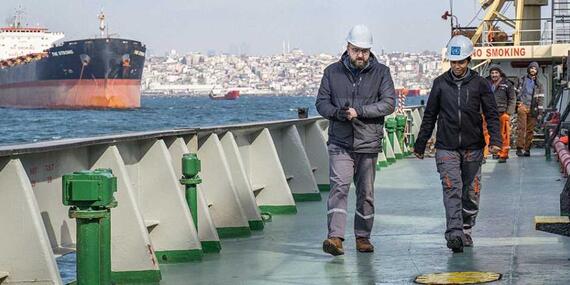With Ukraine war's impact reverberating globally, political solution more vital than ever, UN relief chief tells Security Council

Mr. President,
When I spoke to this Council about the situation in Ukraine last month, I highlighted the humanitarian impact of the full-scale war a year since it started.
I spoke of the death, destruction and hardship it has inflicted – and continues to inflict – on the Ukrainian people.
I shared facts about the casualties it caused, the families it left bereaved, homeless and destitute. That two out of every five people in Ukraine are in need of assistance to get by. The people it forced to flee – including more than eight million refugees in neighbouring countries.
Today, if you allow me, I want to focus on its reverberations around the world. A world already reeling from multiple shocks – hunger, conflict, COVID-19, the climate emergency and a cost-of-living crisis.
Mr. President,
The war has had very significant implications for global food insecurity. As we all know, both the Russian Federation and Ukraine are leading suppliers of key food commodities. The Russian Federation is also a top exporter of fertilizer.
The world relies on these supplies. And so, too, does the United Nations to help those in need: The World Food Programme sources much of the wheat for its global humanitarian response from Ukraine.
Last February, when shipping operations were suspended from Ukrainian ports in the Black Sea, the ripple effects were immediate. By March, following uninterrupted increases from the second half of 2020, global food prices had reached record highs.
The price of fertilizer has also been impacted and remain significantly higher than in 2019. In lower-income countries, some small farmers found themselves priced out of the market.
Reversing those trends was a matter of urgency for the international community. Hence the Black Sea Grain Initiative, and the parallel Memorandum of Understanding between the Russian Federation and the UN Secretariat on the facilitation of Russian food and fertilizer exports.
The signing of the agreements was a critical step in the broader fight against global food insecurity, especially in developing countries. Markets have been calmed and global food prices have continued to fall.
Under the Black Sea Grain Initiative, close to 25 million metric tons of foodstuffs have been safely exported from Ukraine since August. WFP has been able to transport more than half a million metric tons of wheat to support humanitarian operations in Afghanistan, Ethiopia, Kenya, Somalia and Yemen.
Right now, the UN, under Secretary-General Guterres’ leadership, is doing everything possible to make sure that the Black Sea Grain Initiative can continue. We continue to engage closely with all parties. This week, foodstuffs have continued to be transported out of Ukraine through the maritime humanitarian corridor, under the oversight of the Joint Coordination Centre.
On the parallel Memorandum of Understanding with the Russian Federation, the Secretary-General of UNCTAD Rebeca Grynspan and the UN Secretary-General himself are sparing no effort to facilitate its full implementation.
We have made meaningful progress. But impediments remain, notably with regard to payment systems. There is more to do and our efforts to overcome them will continue unabated.
It is vital for global food security that both of these agreements continue and will be fully implemented.
Mr. President,
The world faces an unstable global economy. Poverty is growing. And when we look at where we want to be – the targets we set out in the Sustainable Development Goals – it is clear that we are off track.
The scale of humanitarian needs has vastly outpaced the resources we have available.
Globally, almost 347 million people in 69 countries need humanitarian aid. An unprecedented $54 billion is required to meet these needs, and millions will suffer if we fail to do so.
In 2022, Member States made significant financial efforts to meet the growth in needs as total humanitarian funding reached a historic high of $38.7 billion. It is uncertain if this level of financing can be achieved this year while it is simultaneously clear that we need much more support from Member States, so that we can deliver for the world’s most vulnerable.
We also need closer collaboration between the humanitarian and development communities and international financial institutions. Together, we must seek sustainable solutions to the problems before us – to spiraling humanitarian needs, to the debt crisis, and to the convergence of other problems on the horizon.
More than ever, we need a political solution to the war in Ukraine. The people of Ukraine deserve peace. They deserve to turn the page on this terrible war.
Thank you, Mr. President.
